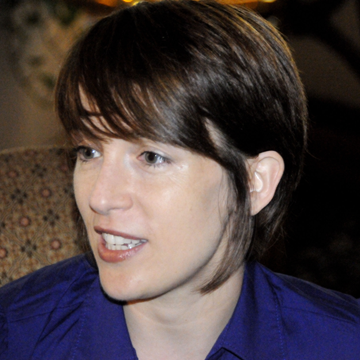By Sabina Clarke
Siobhan Lyons, the new executive director of the Irish Immigration and Pastoral Center in Upper Darby, is young, enthusiastic, accomplished, and bursting with new ideas. The well-traveled daughter of a career diplomat for the Irish Government, Siobhan spent five years of her childhood in Nairobi, Kenya.
Before coming to the Immigration Center, she worked as a freelance translator and then as a diplomat in the Irish Department of Foreign Affairs and most recently as the director of communications at the World Affairs Council in Philadelphia–an experience she values as “a great intro to the non-profit world in Philadelphia.
“She sits on two Boards: the International House and Quest for Tech, a non-profit that provides computer training to low income Philadelphians as well as being a member of Philadelphia Young Non-Profit Leaders.
Her path to the U.S. was accidental and fortuitous; coming through her former husband, a Canadian who studied at Princeton University. Her husband’s job offer brought the couple to Philadelphia, “We found a darling trinity-style house in the Queen Village section of the city.” Now she lives around 9th and Pine Streets, another Philly neighborhood she discovered through Craigslist.
Highly educated and armed with a degree in Arabic and Arabic poetry, she graduated from the School of Oriental and Arabic Studies, part of the University of London, “I did a comparative study of Irish and Arabic poetry. If you think of the Celtic revival and William Butler Yeats and the whole idea of cultural nationalism–the Arabs went through a very similar thing after the creation of the state of Israel. They looked to the Irish experience for inspiration.
“Her interests are eclectic; her favorite author is “easily, Jeanette Winterson, an English novelist” and she loves our restaurants, “especially Ansill in Queen Village and Little Fish and Pumpkin in center city.” She likes theater and saw Madame Butterfly at the Philadelphia Theatre Company and also follows theater at the Brooklyn Academy of Music. How did she wind up at the Immigration Center?”
Actually, that’s a good story. I was at Judge Jimmy Lynn’s breakfast on St. Patrick’s Day with Bill McLaughlin, the president of the Irish American Business Chamber. We started talking with John O’Malley who is on the Irish Immigration Center’s board of directors. John asked me what I was doing in Philadelphia and what I had done and he thought I would be perfect for the Irish Immigration Center. So, he took my details and a few days later, I met Liam Hegarty who is the chairman of the board of the Immigration Center. So, we went from there; it was the luck of the Irish on St. Patrick’s Day.
“Is immigration an issue that interested you?” I think every immigrant into the U.S. is interested in immigration. I have been through all the different classifications in order to work here. It is much harder now; there are a lot of issues to deal with.
“What do you think is the biggest challenge facing immigrants?” I think it is getting a work permit. It is very hard to get a work visa in the U.S. There are more applicants than visas. Last year, about 140,000 people applied for 65,000 visas; and these are people with job offers in the U.S.
“What is the ratio between the visas given to the Irish and to other nationalities?” There are no special visas for the Irish. There is the visa waiver program where you can come as a tourist for up to 90 days without a visa.
“Do you think there should be a special visa for the Irish because of the special relationship between the U.S. and Ireland?” I think that, really, all immigrants need to focus on is comprehensive immigration reform.
“What do you think of groups like the Irish Lobby for Immigration Reform that is exclusively for the Irish?” There is nothing wrong with that; a lot of groups lobby for their own interests.
“What do you think about immigrants who cannot go back to Ireland for a death in the family for fear of not being able to reenter the U.S.?” It is extremely difficult and is one of the issues facing the undocumented Irish; immigration reform means some path to citizenship for the undocumented who are already in the U.S. It has to be made easier for people who have jobs to work legally in this country. If we only focus on amnesty now and not on how we can make it possible for America to create a flexible workforce that benefits immigrants–then we’ll end up creating another group of undocumented immigrants.
“What are your goals with the Immigration Center?” First, I want to make sure that the community is aware of the services we already provide such as applying for a green card and applying for Irish citizenship. I want to expand our services and determine the needs of the community through a survey, with the help of other Irish organizations. In New York, they have launched a senior hotline so I am meeting with the Emerald Isle organization next week. I am meeting with many different organizations in the Irish community and letting them know that we are around and what we have to offer. I hope we find more volunteers. We want to let the Irish community know that we are listening and we are looking for their suggestions so that we can move forward. The founder of the Center made a great start but, now, I think, our challenge is to take it to the next level. We have been doing work with immigration services; now it is time to do more work in the community.
“What can she say for us in Irish?” Go raibh mile maith agat…thanks very much!

